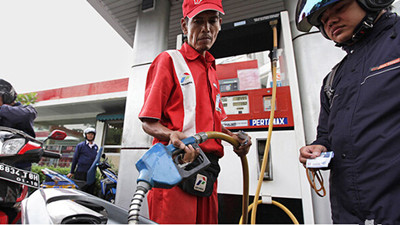能源補貼
Scrap them
廢除
There are moves around the world to get rid of energy subsidies. Here's the best way of going about it
世界上有各種廢除能源補貼的措施,下文是最佳方案。
FOR decades, governments from Egypt to Indonesia have subsidised the price of basic fuels. Such programmes often start with noble intentions—to keep down the cost of living for the poor or, in the case of oil-producing countries, to provide a visible example of the benefits of carbon wealth—but they have disastrous consequences, wrecking budgets, distorting economies, harming the environment and, on balance, hurting rather than helping the poor.
幾十年來,從埃及到印尼,政府都對基本燃料給予價格補貼。這些補貼常常打著高尚的旗號:降低窮人的生活成本,在石油生產國家樹立碳財富收益的榜樣。這往往會產生破壞性的后果,打亂預算,扭曲經濟,破壞環境。總體來說,它們對窮人的傷害比幫助大。

Emerging markets are not the only places that distort energy markets. America, for instance, suppresses prices by restricting exports. But subsidies are more significant in poorer countries. Of the $500 billion a year the IMF reckons they cost—the equivalent of four times all official foreign aid—half is spent by governments in the Middle East and north Africa, where, on average, it is worth about 20% of government revenues. The proceeds flow overwhelmingly to the car-driving urban elite. In the typical emerging economy the richest fifth of households hoover up 40% of the benefits of fuel subsidies; the poorest fifth get only 7%. But the poorest suffer disproportionately from the distortions that such intervention creates. Egypt spends seven times more on fuel subsidies than on health. Cheap fuel encourages the development of heavy industry rather than the job-rich light manufacturing that offers far more people a route out of poverty.
不只有新興市場的能源市場受到扭曲。在美國,政府限制能源出口來抑制價格上漲。但補貼對較貧窮的國家影響更大。在國際貨幣基金組織聲稱的對這些國家年5000億美元的支出中,有一半都是被中東和北美的國家政府消費掉的。這一支出相當于所有官方外援的四倍。在這些政府,補貼占收入的20%。補貼大量流入城區內的有車精英一族。在典型的新興經濟體內,40%的燃料補貼流向了最富有的家庭而最貧窮的家庭只拿到7%。最貧窮的家庭承受著政府補貼帶來的不公。埃及花在能源補貼上的資金是花在醫療保健上的7倍有余。廉價燃料可以促進重工業的發展,而非輕工業。后者能為更多人創造就業機會,提供脫貧機會。
For all these reasons the benefits of scrapping subsidies are immense. Emerging economies could easily compensate every poor person with a handout that was bigger than the benefits they got from cheap fuel and still save money. In the process, they would help the planet. According to the International Energy Agency, eliminating fossil-fuel subsidies would reduce global carbon emissions by 6% by 2020.
基于上述理由,廢除補貼帶來的好處是巨大的。新興經濟體很容易就能補償每個窮人,其收益遠大于廉價燃料,同時還能有余錢儲蓄。在此過程中,它們還保護了地球。根據國際能源署,通過減少化石燃料補貼,到2020年,碳排放能降低6%。
How to save $500 billion and the planet
怎么省下5000億美元又能拯救地球?
Some emerging-market governments are persuaded by these arguments, and are getting serious about reform (see article). Indonesia raised petrol prices by more than 40% last year, and the front-runner in the upcoming presidential election says he will consider a more comprehensive fuel-subsidy revamp. Iran has just begun the second phase of a big subsidy overhaul, raising the price of petrol, gas and electricity. Egypt's new president is being pushed towards tackling energy subsidies by a gaping budget deficit. Morocco and Jordan have cut subsidies in the past couple of years. Even Kuwait announced this week that it plans to scrap diesel subsidies.
一些新興市場的政府被這些辯論說服,于是開始嚴肅對待改革(另見文)。印尼汽油去年提價超過了40%,在接下來的總統大選中,選票領跑者表示他將考慮一個更加復雜的燃油補貼改進。伊朗剛剛開始了第二輪的補貼改進并提高了石油、汽油和電力價格。埃及新總統不得不面臨日益擴大的預算赤字引起的能源補貼問題。摩洛哥和約旦在過去幾年都削減了補貼。甚至科威特也在這周宣布計劃停止柴油機補貼。
Yet the politics of reform are exceedingly difficult. Politicians are loth to antagonise the urban elite; insiders benefit (often corruptly) from cheap fuel; ordinary citizens do not believe they will be compensated. Many previous attempts to cut subsidies have been abandoned in the face of popular protests or rising global oil prices. Experience suggests that any attempt to cut subsidies needs to be accompanied by a public-education campaign to explain the costs and inequities of subsidies, to have a clear timetable for gradual price increases and to be supported by targeted transfers to counter the effect of higher fuel prices on poorer people.
然而改革中的政治博弈極其困難。政治家不愿對抗城市精英,內部人士常常(通過腐敗)從便宜的燃料中得到好處,普通市民則不相信他們能拿到補貼。面臨著日益增多的反抗聲音和全球油價的上漲,很多之前削減補貼的嘗試都被擱置了。經驗表明,任何試圖削減補貼的嘗試都需要相應的配套措施:介紹成本與補貼不平等的公共教育、有關價格逐漸上漲的時間表、有指向的轉移支撐以平息高燃料價格對窮人造成的影響。
Even with better politics and the best-laid plans, it would be a mistake to expect too much too fast. Entrenched subsidies anywhere are devilishly difficult to get rid of. If the oil price rises, so too will the pressure on emerging economies to “protect” their citizens from dearer fuel. But, for the moment, there seems to be a chance to accelerate reform. It is an opportunity not to be missed.
盡管有著更好的政治氛圍和最好的計劃,預期太多太快都是錯誤的。在任何地方,根深蒂固的補貼都是很難擺脫的。如果油價上漲,那么新興經濟體“保護”市民不受更貴燃料影響的壓力就會上漲。但是,目前來看,加快改革似乎是有機會的,這一機會不可錯失。












